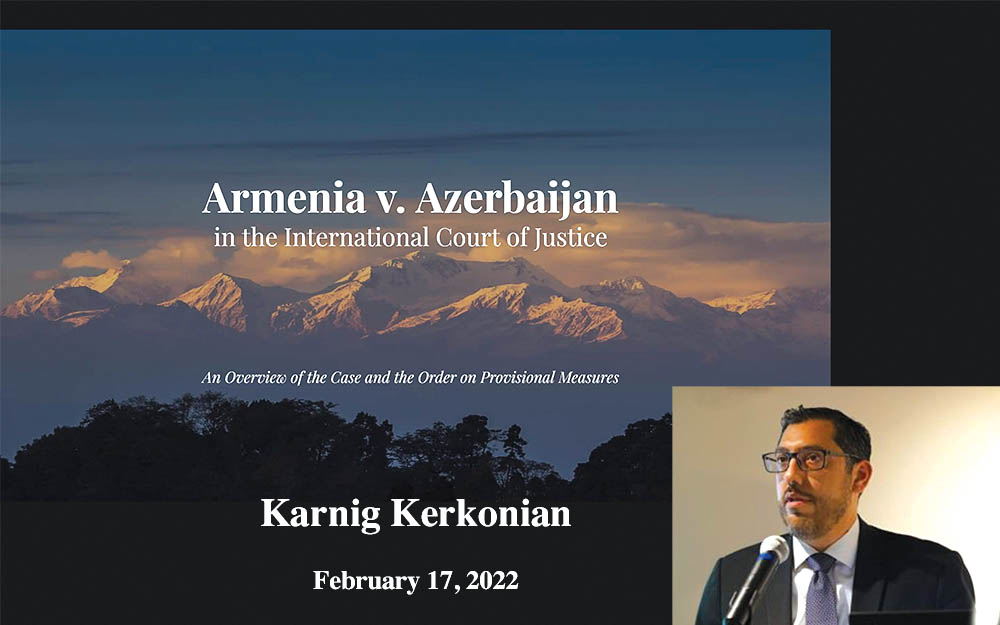
Eddy Thurber
Staff Writer
The International Court of Justice (ICJ) rules against Azerbaijan on all counts! Armenia won a landmark victory in a hearing brought before the ICJ on the basis of urgency and the need for immediate relief. The court made three orders to secure the safety of Armenian prisoners of war, the cessation of hate speech and violence by Azerbaijan, and the destruction of cultural heritage by the same.
Karnig Kerkonian is an international litigator of renown, presenting regularly on issues of human rights before the International Court of Justice and the European Court of Human Rights. He is currently working on the case of Armenia v. Azerbaijan before the International Court of Justice and presented what progress his team has made on the case as well as the road ahead to Armenian Studies students here at Fresno State.
Kerkonian gave his presentation, “Armenia v. Azerbaijan in the International Court of Justice: An Overview of the Case and the Order on Provisional Measures,” on Thursday, February 17, 2022. He spoke via Zoom in a lecture streamed on YouTube and Facebook and was introduced by Prof. Barlow Der Mugrdechian.
Kerkonian, a member of the Armenian delegation to the International Court of Justice, provided Armenian Studies students with an overview of the case itself, the context surrounding the litigation, and the decision reached by the International Court of Justice, or ICJ, on December 7, 2021.
Kerkonian began with a discussion of the ICJ and its jurisdiction. The court can adjudicate cases where a specific promissory clause has been placed into existing treaties, clauses which specifically allow the ICJ to resolve disputes among the parties of said treaty. The United Nations adopted the Convention on the Elimination of All Forms of Racial Discrimination (CERD) in 1965, and from this convention came a binding treaty which entered into force in 1969. This treaty commits its members to criminalize certain forms of hate speech and enacted a universal declaration of human rights and the intention to take all necessary measures to prevent all manifestation of racial, religious, and national hatred.
CERD defined racial discrimination quite broadly, creating a need for specific prohibitions to render the treaty effective. Article 2, for example, requires that states not practice racial discrimination in public settings, and in institutions among other things. Equality before the law regardless of race, color, or nation of origin, practical protection against acts of racial discrimination, prohibition of apartheid and segregation, condemnation of racial supremacist propaganda, criminalization of hate speech, and racial tolerance in education were among many of the other provisions in this treaty.
Kerkonian noted that both Armenia and Azerbaijan ratified and made themselves party to this treaty decades ago. Immediately after the signing of the Trilateral agreement on November 11, 2020, the Armenian Foreign Minister initiated communication with the Azeri Foreign Minister alleging that Azerbaijan violated CERD. After over 40 items of correspondence and seven rounds of meetings, Armenia declared that Azerbaijan refused to admit to any wrongdoing nor intention to remedy damages incurred. On September 16th of 2021, negotiations having failed, Armenia filed its case with the ICJ. Armenia presented the historical context of Armenian-Azeri relations to the court and accused Azerbaijan of breaking the terms of CERD with anti-Armenian hate speech sponsored by the government in Azeri news, in speeches by Azerbaijani President Ilham Aliyev, in the curriculum in public schools, by committing violent acts, and by the destruction of Armenian artifacts and buildings.
While the case has yet to be decided on the merits, Armenia requested a hearing to ask that the court take certain specific actions to end hate speech, destruction of cultural heritage, and the abuse and murder of Armenian POWs by Azerbaijan to take place immediately due to the ongoing civil rights abuses and the urgency of the situation. Armenia presented photos and video of ongoing murder, and torture of POWs, destruction of churches and artifacts, and abuse of civilians to the court and their panel of 15 judges.
On December 7, 2021, the court ruled that Azerbaijan “shall protect from bodily harm and ensure the security of all POWs held by Azerbaijan, and that Azerbaijan must take all necessary measures to prevent the incitement of racial hatred and discrimination by officials and institutions, and that Azerbaijan should take all necessary measures to prevent and punish all vandalism and destruction of Armenian cultural artifacts and buildings.” Kerkonian noted that the ad-hoc judge Azerbaijan contributed to the panel of fifteen ruled against Azerbaijan on the first two counts.
While the case has yet to be heard on the merits, Kerkonian made clear that the decision reached by this court is of utmost importance in terms of the preservation of Armenian culture and the precedent that this will set.
While there are no magic bullets, this ruling is a clear sign of positive change and provides great hope for the future.
The Armenian community is grateful to Mr. Kerkonian for his advocacy on behalf of Armenia before the International Court of Justice, and for his time in speaking to Armenian Studies students at Fresno State and the community to inform them on the case and its progress.
 Hye Sharzhoom Armenian Action
Hye Sharzhoom Armenian Action